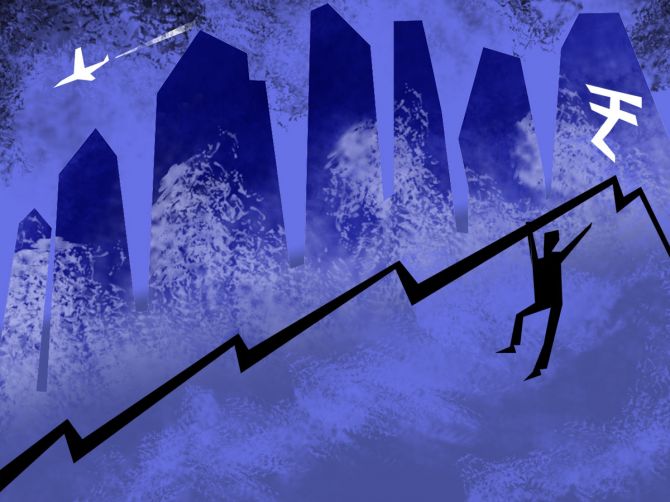'In the overall global portfolio, India's weighting has come down in the past seven months.'

After a world-beating rally, domestic markets are losing their allure to emerging market peers.
Sunil Tirumalai, executive director-India equity strategist, UBS Securities, explains why foreign portfolio investors have turned cautious on India.
In conversation with Samie Modak/Business Standard, Tirumalai says this year's rally is primarily driven by domestic money and those flows could dry up.
How has India managed to outperform most global peers this year?
One, COVID-19 impacted the unorganised or the informal economy, but the listed space has largely benefited.
Two, in 2020-2021, despite the economy shrinking 7.5 per cent, the earnings growth for Nifty companies was probably the best in a decade.
The recovery from lockdowns has been reasonably good without any big government stimulus.
Three, the domestic supplies of vaccines helped and the execution programme was stellar.
Why have all foreign brokerages suddenly turned negative on India?
We have been fairly cautious on the Indian market since June 2021.
At a regional level, UBS has had an 'underweight' stance on India.
We did reiterate that about three weeks ago, when our outlook for the next year came up.
There are a few things now, which are beginning to go against India.
One is, of course, commodity costs. India is an importer of most commodities and costs are beginning to hurt.
All commodity-heavy EMs have done really well.
Companies are talking about pain from commodity inflation and margin pressure.
Gross margins are the lowest in at least five to six years.
Only around 40-45 per cent companies are able to beat consensus expectations on operating profits.
In the past six months, India has underperformed on earnings upgrades.
On the other hand, the Indian market has outperformed other EMs.
In our universe of 12 large EMs, India is probably the ninth or 10th in terms of how earnings are growing.
Also, we are also heading into a kind of politically active period with elections around the corner.
The repeal of farm laws has taken some sheen off a reformist image the Centre had built.
While I mentioned vaccination as a success story, the footnote is not so great.
We seem to be complacent about the second dose.
How are foreign institutional investor flows shaping up?
The last major buying by FIIs happened in March.
When India's second wave started, FIIs stopped buying. It's a relative game.
If you see positive momentum in other countries, flows would ideally go there.
In the last six months, India's earnings have not gone anywhere.
For an investor, who has the option to choose across markets, India is becoming less and less attractive.
FII flows were soft in the June and September quarters.
This is when there was a massive exodus of money from China.
This was at a time when trillions of dollars were being taken out of China.
In the overall global portfolio, India's weighting has come down in the past seven months.
But the markets have continued to do well.
Our belief is that it is primarily driven by domestic money.
For the first nine months of 2021, we've probably seen $28 billion of domestic household flows enter the market, either directly or through mutual funds.
This scale of money is the fuel which is keeping the market up.
As a consequence, India has become very unattractive from a valuation perspective.
Will household savings continue to flow into the markets?
We have early signs of fatigue in household buying.
Just normalisation of life and consumption patterns will lead to lower savings and hence, lower flows.
The flows into equity MFs have been slowing down.
Most activity is only in a few high networth individual accounts.
All you need is a small minority of retail investors to change their mind.
A vast majority of demat account holders are minuscule in the grand scheme of things.
How do you see policy normalisation impacting the equity market?
The linkage with the US Federal Reserve action has become weaker and weaker over the years.
If the Reserve Bank of India acts on draining out liquidity and 10-year bond yields start going up, that is when Indian equities could start correcting.
The Indian bond markets are more expensive than other countries.
It is basically liquidity in all forms that is keeping rates low and valuations high.
If that starts reversing, it could be a problem.
What is your view on technology initial public offerings?
IPOs in the tech space is a fresh new wave.
In the US and China, investors have had good experience of investing in these businesses.
In the long term, if your stock choice is right, you can get really good returns.
There is a belief in India's long-term growth potential.
Some of these businesses have strong capabilities and are expected to do really well.
Most people want to have a slice of that.
What is your view on commodity, banking, and information technology stocks?
I would be positive on banks, negative on IT and commodities.
Over the next six to nine months, UBS expects reduction or a fall in commodity prices.
We have already seen the best of commodity rally play out.
But then, there can be some sub-segments. We like the refining business, in particular.
Private banks are one of my preferred spaces.
They have underperformed since the market is worried about asset quality.
One or two quarters later, there should be some comfort on that front and that's when the catch-up should happen.
All the positives in the top line are fully factored in.
We're already talking about double-digit growth for a few years on this scale.
The cost pressures are also quite intense.
Feature Presentation: Aslam Hunani/Rediff.com












 © 2025
© 2025